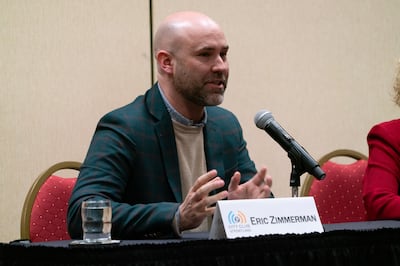Portland City Councilor Eric Zimmerman is proposing to slash the city’s Tree Code regulatory team from 37 people to five, and use the cost savings to avert major cuts to outdoor parks maintenance.
Zimmerman, who represents District 4 on the council, floated the twin proposals during a Wednesday City Council meeting. The meeting allowed councilors to share their preliminary feedback on Mayor Keith Wilson’s proposed budget, which he released on Monday.
Wilson proposed cutting $6.3 million from Portland Parks & Recreation’s maintenance budget, which would have such consequences as fewer restroom cleanings, less weeding and mowing, and fewer repairs to damaged structures.

Instead, Zimmerman proposes the City Council whittle the Tree Code regulation team from 37 to five employees, and move the remaining five to a different city division that handles other city codes.
“The Tree Code enforcement branch—tree regulations—currently has 37 employees. That’s far more than any other code enforcement wing in this government,” Zimmerman said from the dais on Wednesday. “The program utilizes $6.9 million. My amendment [would]...reduce its budget from $6.9 million to $800,000.”
Zimmerman’s second amendment would shift the savings from that cut to offset the maintenance cuts Wilson is proposing in his draft budget.
Councilor Olivia Clark expressed early support for Zimmerman’s proposal. “I’m very interested in the cut that you’re proposing,” she said.
Urban Forestry, which is led by city forester Jenn Cairo, regulates the city’s Tree Code, or Title 11. The Tree Code regulates all street trees in the public right of way and regulates trees on private property that are above a certain circumference.
To do so, Urban Forestry’s regulatory team investigates complaints filed about potential Tree Code violations. Most of the people on that team are tree inspectors, while others work on the back end to process and review tree-related permits. Urban Forestry, which in the current fiscal year has a $26.2 million budget and 114 employees, was the topic of a recent WW cover story (“The Taking Tree, March 5).
The division has grown substantially since Cairo took its reins in 2012, and over the next five years is set to receive $152 million in Portland Clean Energy Fund tax dollars. Those dollars would go toward planting between 15,000 and 25,000 additional trees and place the cost of maintaining street trees on the city, instead of on adjacent property owners.
Meanwhile, Urban Forestry has long contended that it doesn’t have enough tree inspectors to enforce tree regulations under Title 11. The program noted in its 2024 requested budget that it was “not adequately staffed to investigate illegal tree removal or damage, abate hazardous or nuisance trees, nor ensure new trees are planted as required by a permit” due to the high volume of complaints filed with the division annually—more than 700—and asked for more compliance officers.
An Urban Forestry spokesperson did not immediately respond to a request for comment.

